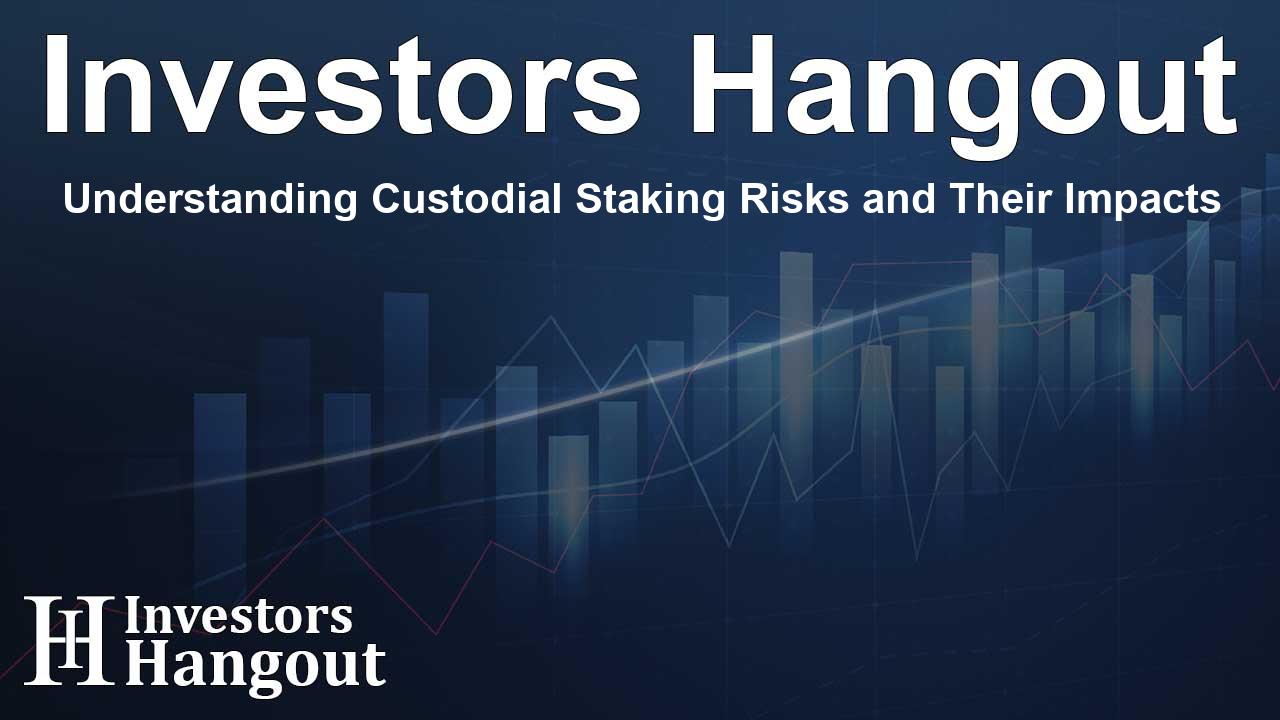Understanding Custodial Staking Risks and Their Impacts

The Hidden Risks of Custodial Staking in DeFi
Recently, many in the decentralized finance (DeFi) sector have started to recognize the unnoticed risks associated with custodial staking platforms. These platforms often advertise staking as a straightforward and risk-free method to earn passive income; however, beneath the surface lies a complexity that can erode returns and impact governance within the blockchain ecosystem.
Yield Erosion: What You Need to Know
When individuals stake their Solana (SOL) tokens, they often expect to receive a return of approximately 8.25% to 10%. Regrettably, custodial staking platforms significantly diminish these yields for their customers. The lowered returns are generally pocketed by these platforms and subsequently sold, resulting in continuous pressure on SOL's market price.
Impact on Governance
Stakeholders who opt for custodial platforms usually surrender their voting rights, unknowingly empowering the exchanges. A pertinent example occurred when a significant governance proposal aimed at lowering inflation was rejected, falling short of a supermajority. The outcomes have raised legitimate concerns regarding the influence that custodial exchanges exert on governance decisions, posing potential risks to the long-term interests of token holders.
Voices in the Industry
Christian Labetzsch, Co-Founder of Blocksize, articulates the situation poignantly, "Many family offices anticipate consistent and predictable returns from staking; however, the reality is that exchanges can significantly impact these results and even utilize governance for their own objectives. This underlines the critical need for transparency and high standards in staking processes."
The Urgent Demand for Transparency
Institutional investors are progressively aware of the invisible costs associated with custodial staking. Hidden charges, unaccountable validators, and potential governance manipulations are pressing concerns. Investors are seeking solutions that provide clarity and control, ensuring their assets are protected against potential pitfalls in the staking process.
Challenges Investors Face
- Loss of yield due to undisclosed platform fees.
- Risks stemming from opaque validator operations.
- Governance capture suppressing vital network upgrades.
- Market volatility eroding overall returns.
- Unaccountable offshore operators compromising security.
Blocksize: Pioneering Transparency in Staking
In light of these challenges, Blocksize emerges as a beacon of transparency in DeFi. This Frankfurt-based provider stands out with its non-custodial staking solutions that prioritize user control and governance rights. Unlike traditional custodial platforms, Blocksize operates transparently under German laws, ensuring accountability and offering valuable oversight to its users.
Institutional-grade Standards
Blocksize's operations adhere to stringent regulations, establishing its solutions in alignment with banking standards despite catering to non-bank clients. They provide:
- Customizable staking fees and service level agreements tailored for family offices and corporations.
- Geo-redundant infrastructure monitored around the clock for maximum uptime.
- Real-time visibility into validator performance and governance activities.
A Robust Ecosystem
To date, Blocksize has successfully facilitated over five million blockchain transactions across more than ten protocols. Their commitment to offering reliable data and performance insights propels a truly decentralized finance ecosystem.
About Blocksize
Blocksize is a prominent name in the DeFi landscape, specializing in non-custodial staking and validator operations. With a strong compliance framework and over seven years of sector experience, the company not only manages its capital but also actively participates in governance, contributing to the development of open-source blockchain tools.
Frequently Asked Questions
What are the risks of custodial staking?
Custodial staking can lead to reduced yields, loss of governance rights, and exposure to potential market manipulation by exchanges.
How does Blocksize address these risks?
Blocksize offers non-custodial staking solutions that ensure users retain governance rights and provides transparency in operations.
Why is transparency important in staking?
Transparency is crucial for ensuring that stakeholders are aware of fees, risks, and how their voting power is being utilized, ensuring alignment of interests.
What standards does Blocksize adhere to?
Blocksize operates within strict regulatory frameworks, ensuring that its services are compliant with high industry standards for security and performance.
How has Blocksize contributed to the DeFi ecosystem?
Blocksize supports numerous protocols and provides real-time market data to enhance the overall functionality and trust within the decentralized finance sector.
About The Author
Contact Ryan Hughes privately here. Or send an email with ATTN: Ryan Hughes as the subject to contact@investorshangout.com.
About Investors Hangout
Investors Hangout is a leading online stock forum for financial discussion and learning, offering a wide range of free tools and resources. It draws in traders of all levels, who exchange market knowledge, investigate trading tactics, and keep an eye on industry developments in real time. Featuring financial articles, stock message boards, quotes, charts, company profiles, and live news updates. Through cooperative learning and a wealth of informational resources, it helps users from novices creating their first portfolios to experts honing their techniques. Join Investors Hangout today: https://investorshangout.com/
The content of this article is based on factual, publicly available information and does not represent legal, financial, or investment advice. Investors Hangout does not offer financial advice, and the author is not a licensed financial advisor. Consult a qualified advisor before making any financial or investment decisions based on this article. This article should not be considered advice to purchase, sell, or hold any securities or other investments. If any of the material provided here is inaccurate, please contact us for corrections.
